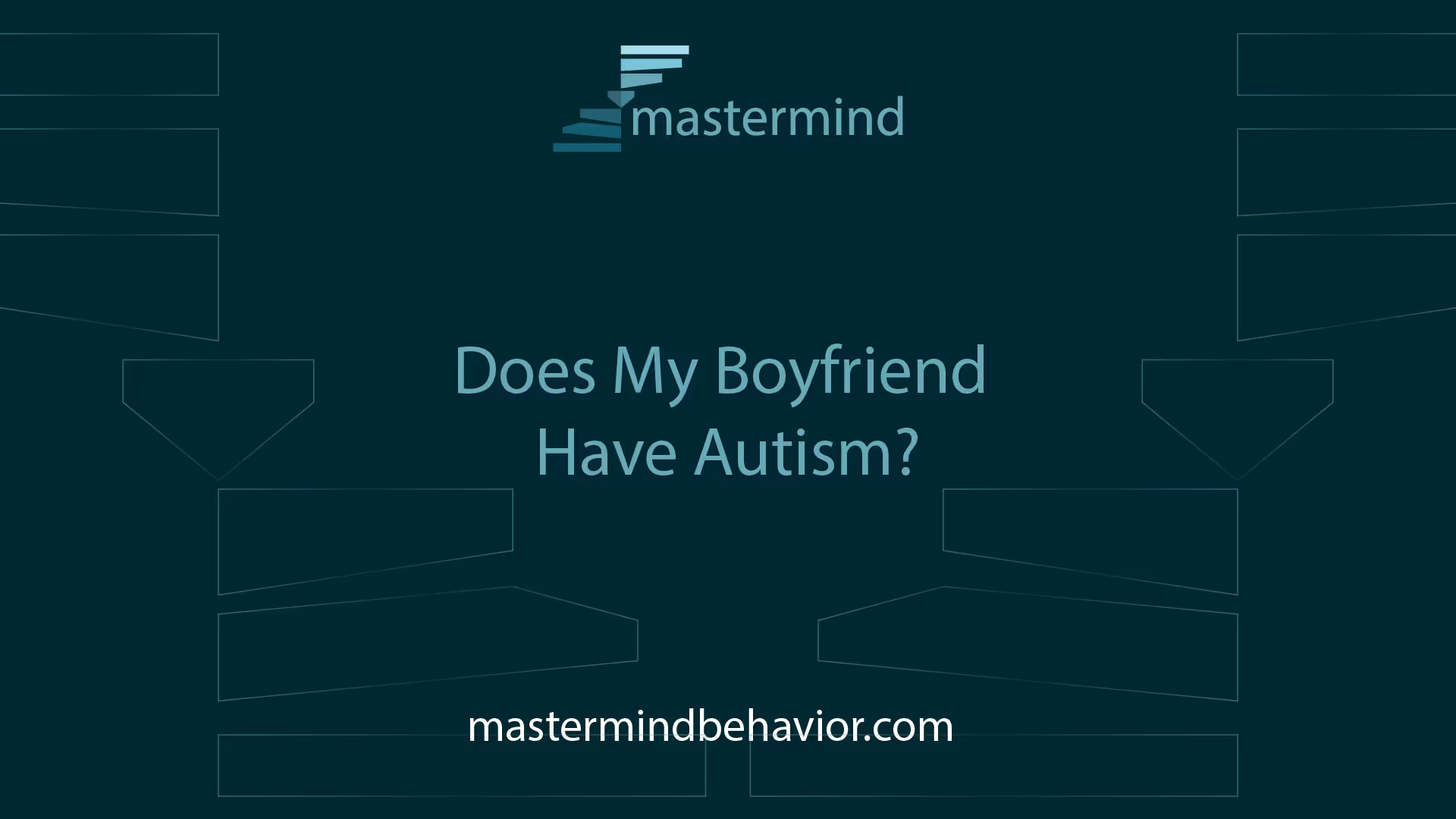Does My Boyfriend Have Autism?


Understanding Autism Spectrum
Gaining insight into the characteristics of autism spectrum disorder (ASD) is essential for understanding a partner who may display certain traits. The unique qualities of individuals with autism can significantly impact their relationships, communication, and social interactions.
Signs in Adults
Adult individuals on the autism spectrum may exhibit a variety of signs. These can include social awkwardness, difficulty interpreting social cues, and challenges with emotional regulation. Many may also mask or camouflage their symptoms to fit into social scenarios, which can complicate understanding their true feelings and behaviors.
Here is a table summarizing common signs of autism in adults:
SignDescriptionSocial ChallengesDifficulty with social interactions and maintaining friendshipsCommunication IssuesTrouble expressing thoughts or understanding sarcasm or humorSensory SensitivitiesOver- or under-responsiveness to sensory stimuliDifficulty with ChangeStruggling with routine changes and new environmentsEmotional RegulationIssues managing emotions, often leading to anxiety
Understanding these signs can help partners recognize the behaviors that may be linked to autism and foster a supportive environment.
Gender Differences
Research indicates that there may be notable differences in how autism manifests in different genders. Men are more frequently diagnosed with autism than women, and this might contribute to the perception that autism primarily affects males. However, women can present autism traits differently. They may engage in masking, where they disguise their symptoms to fit in socially, potentially leading to underdiagnosis in females.
Furthermore, gender may influence the types of interests and behaviors exhibited by individuals on the spectrum. Women with autism might exhibit special interests that align more closely with socially acceptable hobbies, making it harder to identify the signs of autism. Understanding these gender differences is essential for accurately recognizing whether one might ask the question, "does my boyfriend have autism?"
The diverse presentations of autism highlight the importance of awareness and sensitivity when discussing the spectrum and its effects on relationships. For a deeper understanding of autism signs, consider exploring our articles on signs & symptoms of autism in adults or signs & symptoms of autism in teens.
Assessing Social Challenges
When a partner exhibits social difficulties, it is essential to assess the underlying causes. This may include seeking professional guidance and focusing on communication improvement. Understanding these aspects plays a significant role in determining if the question, "does my boyfriend have autism?" has merit.
Seeking Professional Guidance
Engaging a mental health professional can be invaluable. A professional diagnosis can clarify whether social issues stem from conditions like Social Anxiety Disorder, Autism Spectrum Disorder, or Adult ADHD. Assessment by a qualified expert offers tailored recommendations and can help partners move forward with informed strategies.
ConditionDescriptionSymptomsSocial Anxiety DisorderIntense fear of social situationsPanic in public, avoidance behaviorsAutism Spectrum DisorderDevelopmental condition affecting communication and behaviorDifficulty with social interactions, repetitive behaviorsAdult ADHDAttention deficit hyperactivity disorder in adultsImpulsivity, difficulty focusing and organizing
Each condition has distinct characteristics, making it vital to understand the nuances of their impacts on relationships.
Communication Improvement
Improving communication skills is essential for partners facing social challenges. People with such difficulties can work toward overcoming these issues through training, counseling, or practice. Although they may not achieve proficiency similar to the most socially adept individuals, they can often reach a level comparable to that of average, well-functioning individuals.
Strategies for improving communication include:
Awareness of each partner's feelings regarding social issues is essential. Often, each individual may perceive the challenges differently. Addressing these perceptions through counseling or support groups can provide valuable insights and coping mechanisms for both partners [2].
By focusing on understanding the unique social challenges that may arise in a partnership, both individuals can work together to create a supportive environment conducive to growth and communication.
Supporting a Partner with Autism
Understanding how to support a partner with autism is vital for fostering a healthy and loving relationship. This involves both education and empathy, as well as recognizing the unique perceptions each partner may hold.
Education and Empathy
Educating oneself about a partner's social condition is essential for providing effective support. Learning about Autism Spectrum Disorder (ASD) can offer insight into the symptoms and communication challenges faced by individuals. Reading books, browsing websites, or watching videos centered on autism can aid in developing a deeper understanding of the condition.
Empathy plays a crucial role in supporting a partner with autism. It encourages understanding and helps partners acknowledge the difficulties faced by autistic individuals. Many autistic adults engage in masking or camouflaging their autism symptoms to fit socially, which can create additional stress. Being empathetic allows for a supportive environment where partners feel safe expressing themselves without the fear of judgment.
Educational ResourcesBenefitsBooks on AutismProvides insight into the condition and coping strategiesVideos on ASDVisual understanding of challenges faced by autistic individualsOnline ForumsSupport from others with similar experiences
Couples' Perception
In couples where one member has social difficulties, each partner may perceive the relationship dynamics differently. It is essential for partners to recognize their feelings regarding their partner's social behavior. Open communication about these perceptions allows couples to better support each other and foster a stronger relationship. This also encourages partners to address any misunderstandings that may arise from social situations.
Recognizing unique sensory needs in different environments can help facilitate a more comfortable daily life for the autistic partner. Sensory accommodations, such as modifying spaces or using specific tools, can ease discomfort and enhance learning and socialization [3].
Perception AreasFocus PointsUnderstanding BehaviorDiscuss feelings about social interactionsAcknowledging EmotionsAddress personal frustrations or challengesImplementing AccommodationsAdapt environments based on sensory needs
Supporting a partner with autism requires a commitment to understanding, education, and empathetic engagement. These practices contribute to a stronger relationship and a better quality of life for both partners. For those looking for more information, consider exploring resources related to autism and therapy animals or types of therapy for autism.
Counseling Benefits
Counseling can play a significant role in navigating the complexities of relationships where one partner may be on the autism spectrum. Whether through individual sessions or couples therapy, seeking professional support can facilitate a deeper understanding of challenges, social difficulties, and overall relationship dynamics.
Individual Counseling
Individual counseling offers a safe space for the partner experiencing social difficulties to explore their feelings, challenges, and coping mechanisms. This environment allows for personal growth and self-awareness, which can enhance their ability to communicate and interact within the relationship.
Through individual therapy, individuals can learn skills to better manage their social interactions and sensory sensitivities, which can often be a source of frustration in relationships. Therapy may also include developing strategies to address sensory accommodations, such as modifying environments to reduce overstimulation. The support gained from individual counseling can empower partners to advocate for themselves and engage more openly with their loved ones.
BenefitDescriptionSelf-awarenessUnderstanding personal challenges and emotions can lead to improved communication in the relationship.Coping strategiesLearning and practicing techniques to manage social interactions and sensory sensitivities.Personal growthGaining insights that enhance confidence and comfort in navigating social situations.
Couples Counseling
Couples counseling provides an environment where both partners can express their feelings and perceptions openly. This approach helps to bridge gaps in understanding, especially when one partner may view social challenges differently than the other [2].
Therapists can assist couples in developing effective communication skills, allowing them to articulate their needs, perceptions, and emotions without conflict. This process can greatly enhance mutual respect and understanding, ultimately fostering a more supportive partnership.
In couples therapy, partners may also work on sensory needs and accommodations, learning how to adjust plans or environments to better suit the needs of the autistic partner. This adaptability can enhance quality of life and relationship satisfaction for both individuals.
BenefitDescriptionImproved communicationEnhancing dialogue about feelings and needs can prevent misunderstandings and resentment.Shared understandingFostering awareness of each partner's perspective regarding social challenges and behaviors.Joint strategiesDeveloping collaborative plans to address sensory needs and relationship dynamics.
Exploring the benefits of counseling, both individually and as a couple, offers valuable insights into navigating the challenges associated with autism. Support and guidance in therapy can lead to stronger relationships and a greater understanding of how to support one another effectively. For those wondering, does my boyfriend have autism? — these strategies can be integral in comprehending and addressing such queries.
Prevalence and Misdiagnosis
Understanding the prevalence of autism spectrum disorder (ASD) and the challenges in obtaining an accurate diagnosis is essential for identifying whether someone may have autism, such as when questioning, "does my boyfriend have autism?"
Rates in the U.S.
According to recent statistics, approximately 1 in 45 adults in the U.S. are diagnosed with autism spectrum disorder. This statistic highlights a significant prevalence of autism among adults in the country. Despite increased awareness and screening efforts, many adults with autism either remain undiagnosed or suffer from misdiagnosis [1].
StatisticRateAdults diagnosed with ASD1 in 45
Challenges in Diagnosis
Diagnosing autism can be complicated due to various factors. Many autistic individuals experience sensory sensitivities, which can either manifest as hypersensitivity or hyposensitivity.
Moreover, autistic individuals have rights to request reasonable accommodations at work and school, particularly for sensory needs. Self-advocacy is crucial in this process, requiring individuals to identify their needs, implement changes in their environment, and test new strategies. Understanding these sensory needs can take time and often involves a process of trial and error.
For further exploration of how autism impacts individuals in different contexts, consider looking into types of therapy for autism or learn about raising a child with autism.
Sensory Sensitivities in Autism
Understanding sensory sensitivities plays a crucial role in recognizing how autism may affect relationships. Individuals on the autism spectrum often experience Sensory Processing Disorder (SPD), which can lead to unique challenges in everyday activities and social interactions.
Sensory Processing Disorder
Sensory Processing Disorder (SPD) significantly impacts how individuals perceive sights, sounds, and tactile experiences. Everyday activities may become overwhelming for them. For example, some individuals may need to cut out clothing tags to avoid discomfort, while others may react strongly to loud sounds, such as fire engines. They may experience sensations, such as itchiness, more intensely, feeling as though their skin is on fire [4].
Adults with SPD can either over-respond or under-respond to sensory stimuli. For instance, someone might enjoy attending music concerts due to a higher tolerance for sound, while another person may need to avoid such events entirely to prevent feeling overwhelmed.
Considering these varied experiences, it becomes essential for partners to adapt their plans and activities to accommodate sensory sensitivities.
Impact on Relationships
Sensory sensitivities can deeply influence relationships, requiring partners to communicate openly about their needs and preferences. Partners of individuals with SPD can enhance their shared experiences by planning activities that take sensory sensitivities into account. For example, going to the gym during off-peak hours can help minimize overwhelming auditory stimuli. These conscious choices can foster memorable and enjoyable moments together.
It is also vital for partners to respect dietary needs that may stem from sensory sensitivities. Supporting one another by choosing appropriate dining options or exploring new nutritious foods together can solidify the relationship bond.
Checking in regularly about sensory experiences enables partners to understand each other better. Plans may need adjustments based on how one's sensory state fluctuates, and partners should provide supportive spaces for self-regulation during overstimulating situations.
By considering these factors, couples can navigate the complexities that arise from sensory sensitivities, ultimately leading to a more nurturing and understanding relationship.
References
[2]:
[3]:
[4]:
Recent articles

The impact of inclusive recreational activities
Building Bridges Through Play: Fostering Diversity and Well-being

How ABA Therapy Promotes Positive Peer Interactions for Children with Autism
Fostering Connections: The Power of ABA in Enhancing Social Skills for Autistic Children

The Benefits of Cross-Disciplinary Collaboration in Autism Treatment
Unlocking Holistic Autism Care Through Teamwork

How ABA Therapy Can Support Children in Handling Unexpected Changes
Supporting Flexibility and Resilience in Children with ABA

How to Build a Home-Based Therapy Plan for Children with Autism
Creating Effective Home-Based Autism Interventions

How to Introduce Shared Activities to Promote Social Connections in ASD
Fostering Social Bonds in Autism Spectrum Disorder Through Engaging Shared Activities


